Faire Conjugation in All 8 Tenses
Faire in French is one of the most frequently used verbs. The meaning of faire is “to do” or “to make”.
This article gives you faire conjugations in the most common indicative tenses of the French language, as well as some hints on how you would use them in everyday speech. This article will also help you to learn correct grammar so your speech and communication skills in French become top notch!
Why only the 8 indicative tenses? Because those are the tenses you’ll hear when practicing your French! There are 13 other tenses but they have more to do with mood and intent. On top of that they’re rarely used, so even if you’re an intermediate or advanced French learner then the indicative 8 are ALL you need!
Before you continue: Corrector provides a free tool to help you correct grammar and spelling in any language (including conjugations)! Just click here to access it!
French Tenses for Faire Conjugation
- Présent. Something that is happening now. This can either be ongoing or instant. Eg: I do. / I’m making.
- Imparfait (imperfect). Used to describe ongoing, continual or habitual past events. Eg: I was doing.
- Passé simple is not common and normally found in formal or literary contexts. If you’re a beginner or even intermediate French learner then you can safely ignore it for now (but it’s still included below for convenience). Eg: I did.
- Passé composé. Widely used to talk about completed past actions. Eg: I made.
- Futur simple (simple future) is used when you intend to describe a general future state of being. Eg: I will make. Once again, beginners can generally ignore this conjugation as there’s a much simpler version (next in list) that will suffice for now.
- Futur proche (near future) describes an upcoming action. In English this would be “I am going to make …“. This should be your go to future tense when learning conjugations.
- Plus-que-parfait (pluperfect). This tense indicates that an action had taken place and was completed before another past action took place. Eg: I did it before eating my meal.
- Passé antérieur is not common at all (just like passé simple), and again is found in formal or literary contexts. Eg: I had made.
- Futur antérieur (future perfect) is used to describe a future action that will be completed in the future before another action is started. For example: I will have made my bed before eating breakfast.
Mastering faire conjugation in at least 3 tenses (present, passé composé and futur proche is essential for becoming proficient in French. In fact I would concentrate on these 3 and only study the others when they come up in literature or other contexts.
The following tables also give usage examples of faire used in its respective tense.
Faire Présent Conjugation (Present)
| Pronoun | Conjugation | English Translation |
|---|---|---|
| Je | fais | I do/make |
| Tu | fais | You do/make |
| Il/Elle | fait | He/She does/makes |
| Nous | faisons | We do/make |
| Vous | faites | You do/make |
| Ils/Elles | font | They do/make |
Présent (Present) Tense Usage: The Présent tense is used to describe actions or states that are happening at the current moment or are generally true. It is the most frequently used tense in all languages. Note that French doesn’t have the present continuous verb tense like in English. Hence, “I do” and “I am doing” both translate to je fais.
Example sentences:
- Je fais mes devoirs tous les soirs. (I do my homework every evening.)
- Tu fais de la cuisine pour le dîner. (You are cooking for dinner.)
- Nous faisons une promenade dans le parc. (We are taking a walk in the park.)
Faire Imparfait Conjugation (Imperfect)
| Pronoun | Conjugation | English Translation |
|---|---|---|
| Je | faisais | I was doing/making |
| Tu | faisais | You were doing/making |
| Il/Elle | faisait | He/She was doing/making |
| Nous | faisions | We were doing/making |
| Vous | faisiez | You were doing/making |
| Ils/Elles | faisaient | They were doing/making |
Imparfait (Imperfect) Tense Usage: The Imparfait tense is used to describe ongoing or habitual actions from the past. It is commonly used to set the background for other actions in the past. In everyday French it is used to talk about past events or actions that were ongoing. Imparfait is also used to talk about feelings, attitudes, time & date and the weather.
Example sentences:
- Elle faisait ses devoirs pendant que je lisais un livre. (She was doing her homework while I was reading a book.)
- Nous faisions souvent du vélo dans le quartier. (We used to ride bikes around the neighborhood.)
- Ils faisaient la fête lorsque nous sommes arrivés. (They were partying when we arrived.)
Faire Passé Simple Conjugation (Simple Past)
| Pronoun | Conjugation | English Translation |
|---|---|---|
| Je | fis | I did/made |
| Tu | fis | You did/made |
| Il/Elle | fit | He/She did/made |
| Nous | fîmes | We did/made |
| Vous | fîtes | You did/made |
| Ils/Elles | firent | They did/made |
Passé Simple (Simple Past) Tense Usage: The Passé Simple manger conjugation is primarily used in written literature, especially within narrative texts such as novels, stories, and historical accounts. In everyday spoken language, the Passé Simple is rarely used but you will see it everywhere in the aforementioned literary works. In meaning there is virtually no difference between this tense and the Passé Composé.
Example sentences:
- Elle fit une belle présentation lors de la réunion. (She gave a great presentation during the meeting.)
- Ils firent un gâteau délicieux pour l’anniversaire. (They made a delicious cake for the birthday.)
- Tu fis beaucoup d’exercice hier. (You did a lot of exercise yesterday.)
Faire Passé Composé Conjugation (Present Perfect)
| Pronoun | Conjugation | English Translation |
|---|---|---|
| J’ | ai fait | I have done/made |
| Tu | as fait | You have done/made |
| Il/Elle | a fait | He/She has done/made |
| Nous | avons fait | We have done/made |
| Vous | avez fait | You have done/made |
| Ils/Elles | ont fait | They have done/made |
Passé Composé (Present Perfect) Tense Usage: The Passé Composé tense is used to talk about completed actions in the past. It is one of the most common past tenses and is frequently used in everyday French language. The key fact you need when deciding to use this tense is to ask if the past action have a start and finish in the past. If yes, then Passé Composé is the tense you need!
Example sentences:
- J’ai fait mes devoirs avant de sortir. (I have done my homework before going out.)
- Nous avons fait une randonnée en montagne ce weekend. (We went hiking in the mountains this weekend.)
- Ils ont fait beaucoup de progrès dans leur travail. (They have made a lot of progress in their work.)
Faire Futur Simple Conjugation (Simple Future)
| Pronoun | Conjugation | English Translation |
|---|---|---|
| Je | ferai | I will do/make |
| Tu | feras | You will do/make |
| Il/Elle | fera | He/She will do/make |
| Nous | ferons | We will do/make |
| Vous | ferez | You will do/make |
| Ils/Elles | feront | They will do/make |
Futur Simple (Simple Future) Tense Usage: The futur simple manger conjugation is used to express an eating action that will happen in the future. It is commonly used in everyday language when talking about general future plans or intentions. If you find this tense complicated then you can always just use the “aller” form in the next section “futur proche”.
Example sentences:
- Je ferai le ménage demain matin. (I will do the house cleaning tomorrow morning.)
- Vous ferez du shopping cet après-midi. (You will go shopping this afternoon.)
- Ils feront une fête pour célébrer leur réussite. (They will throw a party to celebrate their success.)
Faire Futur Proche Conjugation (Near Future)
| Pronoun | Conjugation | English Translation |
|---|---|---|
| Je | vais faire | I am going to do/make |
| Tu | vas faire | You are going to do/make |
| Il/Elle | va faire | He/She is going to do/make |
| Nous | allons faire | We are going to do/make |
| Vous | allez faire | You are going to do/make |
| Ils/Elles | vont faire | They are going to do/make |
Futur Proche (Near Future) Tense Usage: This is also known as the “going to [be]” future tense. It is used to express actions that are planned or about to happen in the near future. It is very commonly used in everyday spoken French.
Example sentences:
- Je vais faire mes courses tout de suite. (I am going to do my groceries right away.)
- Nous allons faire une pause après cette réunion. (We are going to take a break after this meeting.)
- Ils vont faire du camping ce week-end. (They are going to go camping this weekend.)
Faire Plus-que-parfait Conjugation (Pluperfect)
| Pronoun | Conjugation | English Translation |
|---|---|---|
| J’ | avais fait | I had done/made |
| Tu | avais fait | You had done/made |
| Il/Elle | avait fait | He/She had done/made |
| Nous | avions fait | We had done/made |
| Vous | aviez fait | You had done/made |
| Ils/Elles | avaient fait | They had done/made |
Plus-que-parfait (Pluperfect) Tense Usage: This tense is used to express actions that had happened before some other past action took place. It is commonly used in written language, especially in literature and formal texts.
Example sentences:
- J’avais fait mes devoirs avant de sortir. (I had done my homework before going out.)
- Nous avions fait nos valises avant le voyage. (We had packed our bags before the trip.)
- Ils avaient fait la réservation pour le restaurant. (They had made the reservation for the restaurant.)
Faire Passé Antérieur Conjugation (Past Anterior)
| Pronoun | Conjugation | English Translation |
|---|---|---|
| J’ | eus fait | I had done/made |
| Tu | eus fait | You had done/made |
| Il/Elle | eut fait | He/She had done/made |
| Nous | eûmes fait | We had done/made |
| Vous | eûtes fait | You had done/made |
| Ils/Elles | eurent fait | They had done/made |
Passé Antérieur (Past Anterior) Tense Usage: This tense is a literary tense used in formal and historical writing. It is similar in meaning to the Plus-que-parfait tense (Pluperfect) but is considered more archaic and is mostly found in classical literature. As a French speaker you will hardly ever (if at all) use this tense!
Example sentences:
- J’eus fait mes devoirs avant que tu n’arrives. (I had done my homework before you arrived.)
- Ils eurent fait les réparations avant la réunion. (They had made the repairs before the meeting.)
- Nous eûmes fait nos préparatifs bien à l’avance. (We had made our preparations well in advance.)
Faire Futur Antérieur Conjugation (Future Perfect)
| Pronoun | Conjugation | English Translation |
|---|---|---|
| J’ | aurai fait | I will have done/made |
| Tu | auras fait | You will have done/made |
| Il/Elle | aura fait | He/She will have done/made |
| Nous | aurons fait | We will have done/made |
| Vous | aurez fait | You will have done/made |
| Ils/Elles | auront fait | They will have done/made |
Futur Antérieur (Future Perfect) Tense Usage: The Futur Antérieur tense is used to express actions that will have been completed before a specific future point in time. In fact that preceding sentence is an exact example of it, using the phrase “will have been”. It is used both in written and spoken language.
Example sentences:
- J’aurai fait mon travail avant la fin de la journée. (I will have done my work before the end of the day.)
- Ils auront fait les réservations pour les vacances. (They will have made the reservations for the holidays.)
- Vous aurez fait tous les préparatifs avant l’événement. (You will have done all the preparations before the event.)
Wrap Up
Faire conjugation isn’t too difficult to learn as long as you stick to present, futur proche and imparfait tenses. You can safely ignore the others for now (but do come back when you’re happily proficient in French).
If you’d like to read more about French verbs, conjugation and tenses then check out this article on how to master French verb conjugations. Lot’s of great tips in there if you’re struggling!
Alternatively let us do the hard work of analysing your French texts by using our free tool!
Faire Conjugation Table Images (FREE to Download)
To download a zip file of all the Faire Conjugations simply click this link. Alternatively click the images below and save individual manger conjugations.
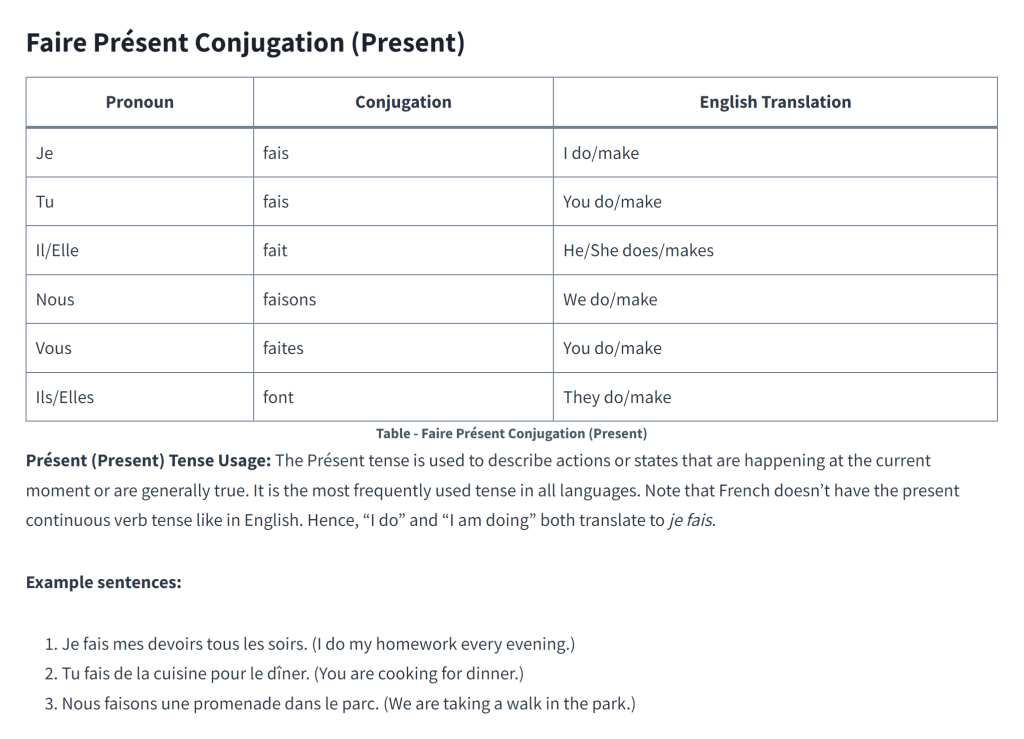
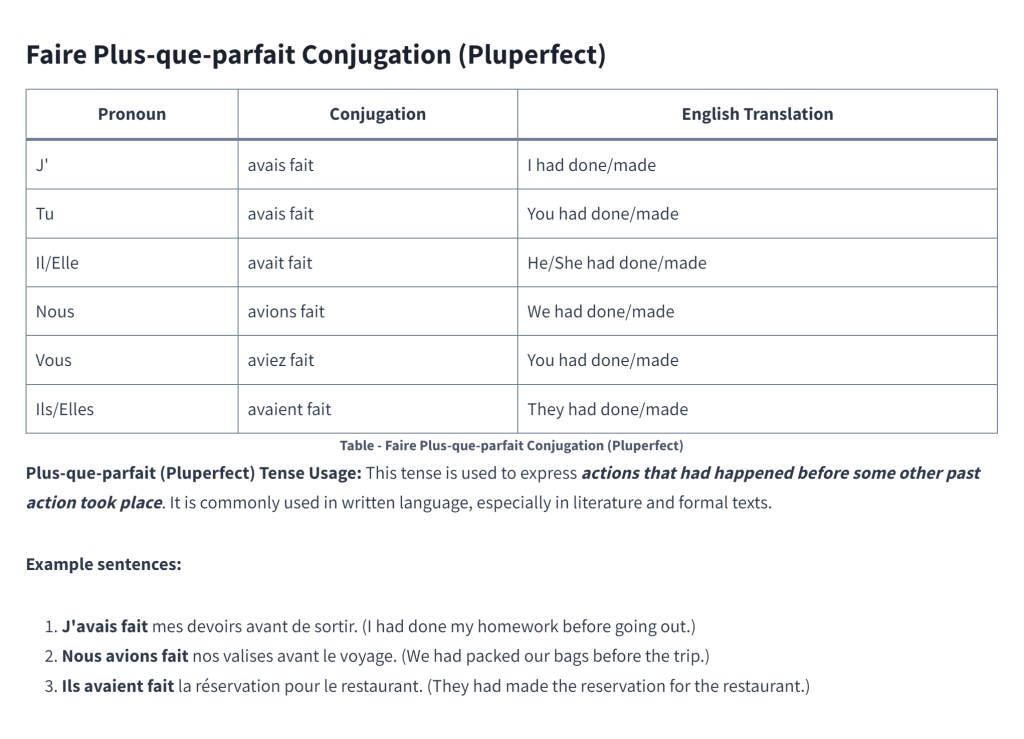
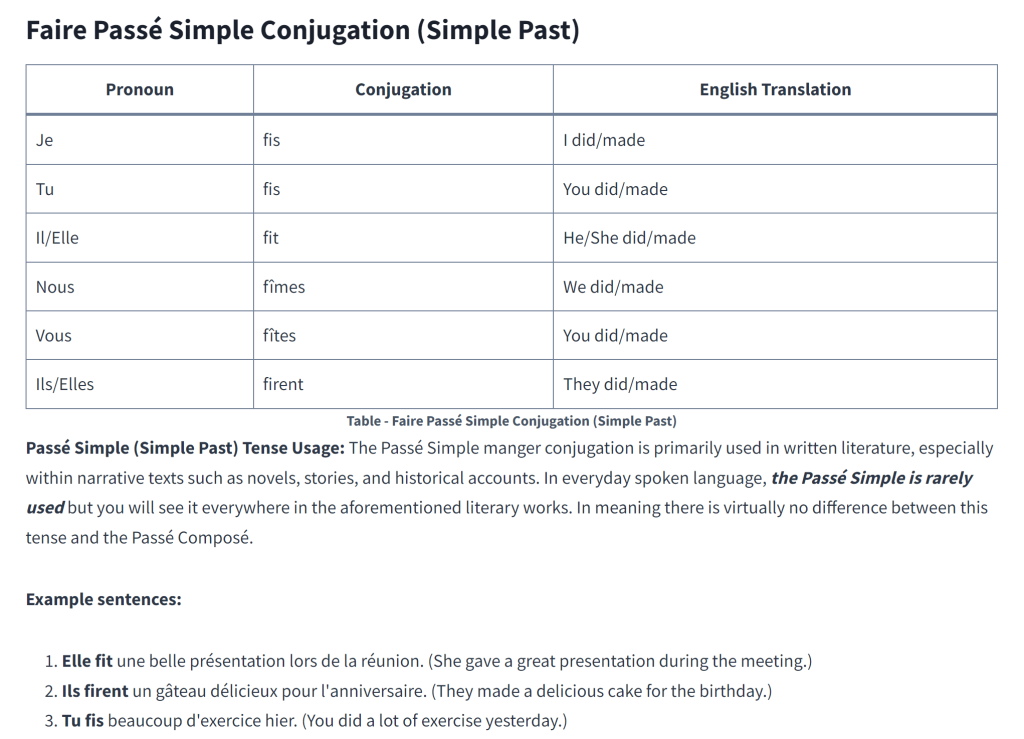
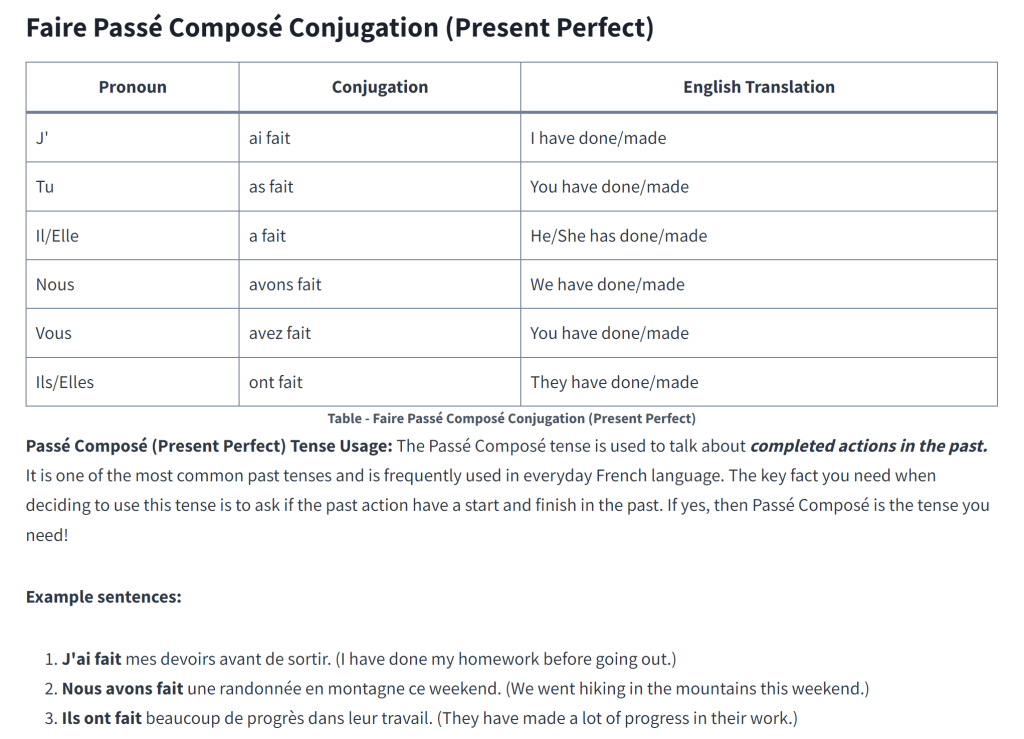
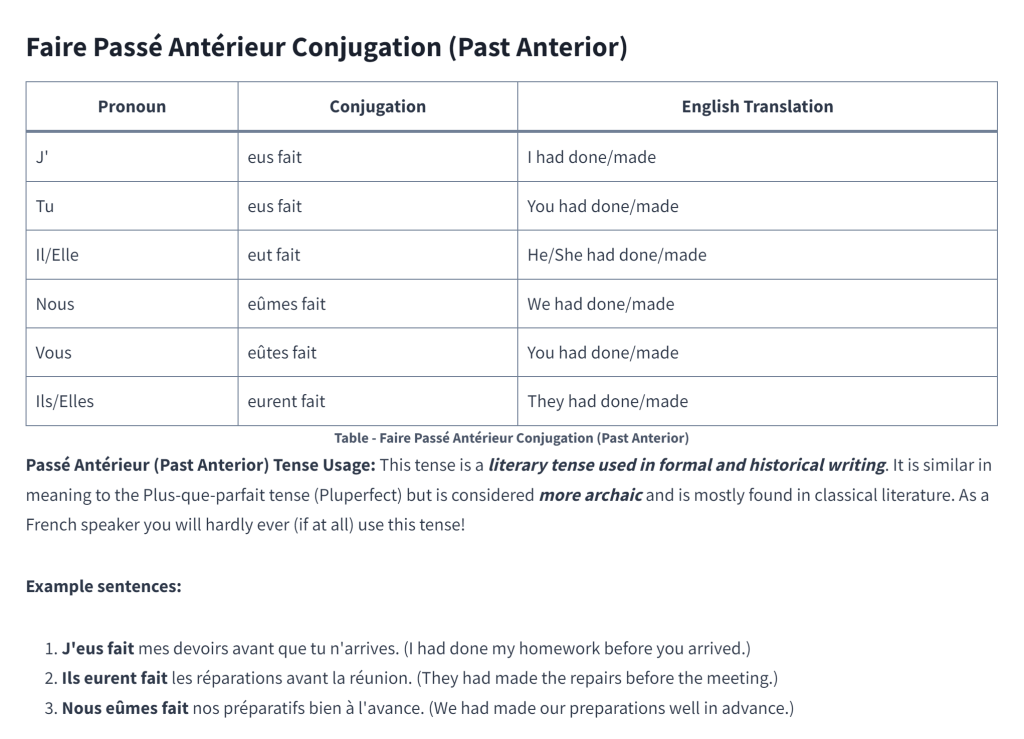
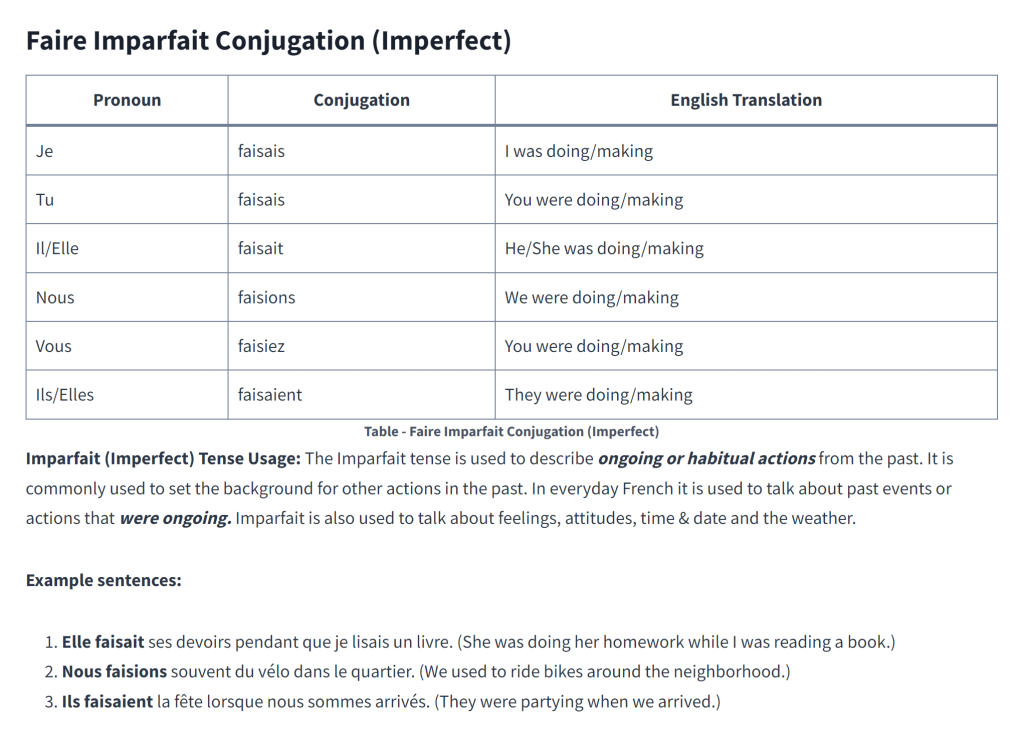
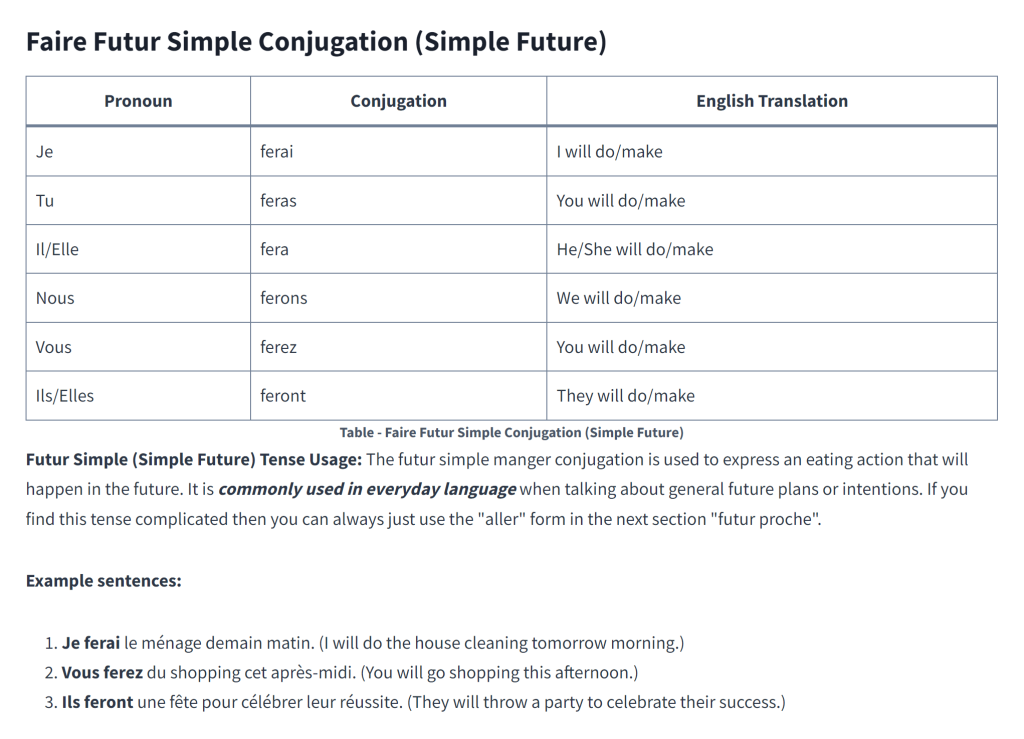
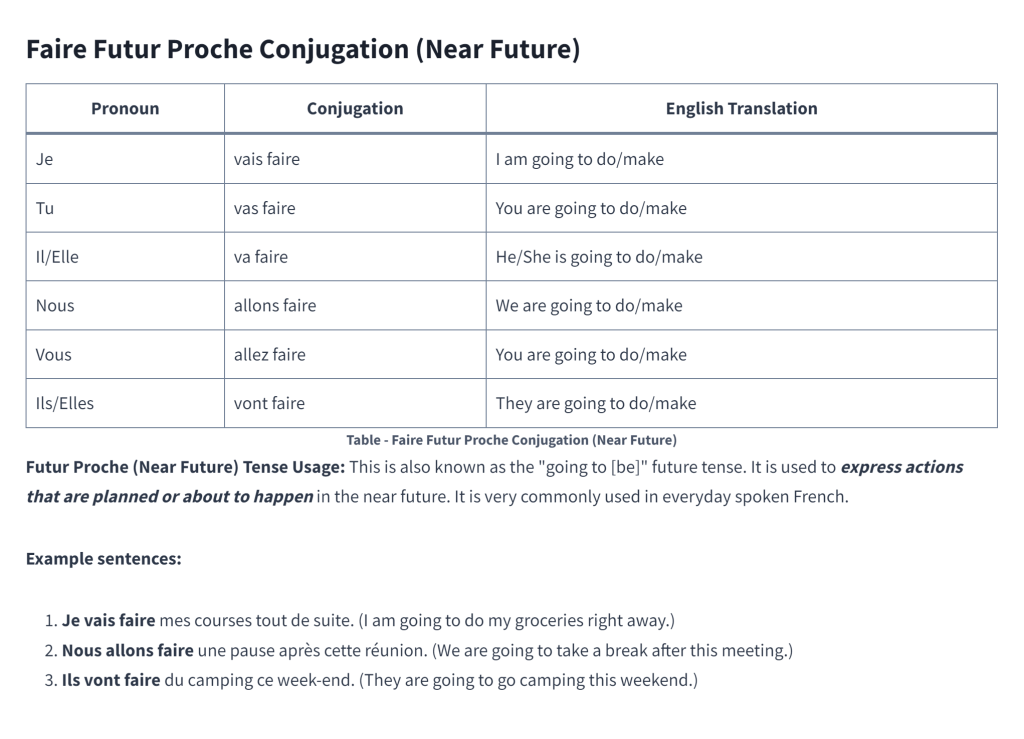
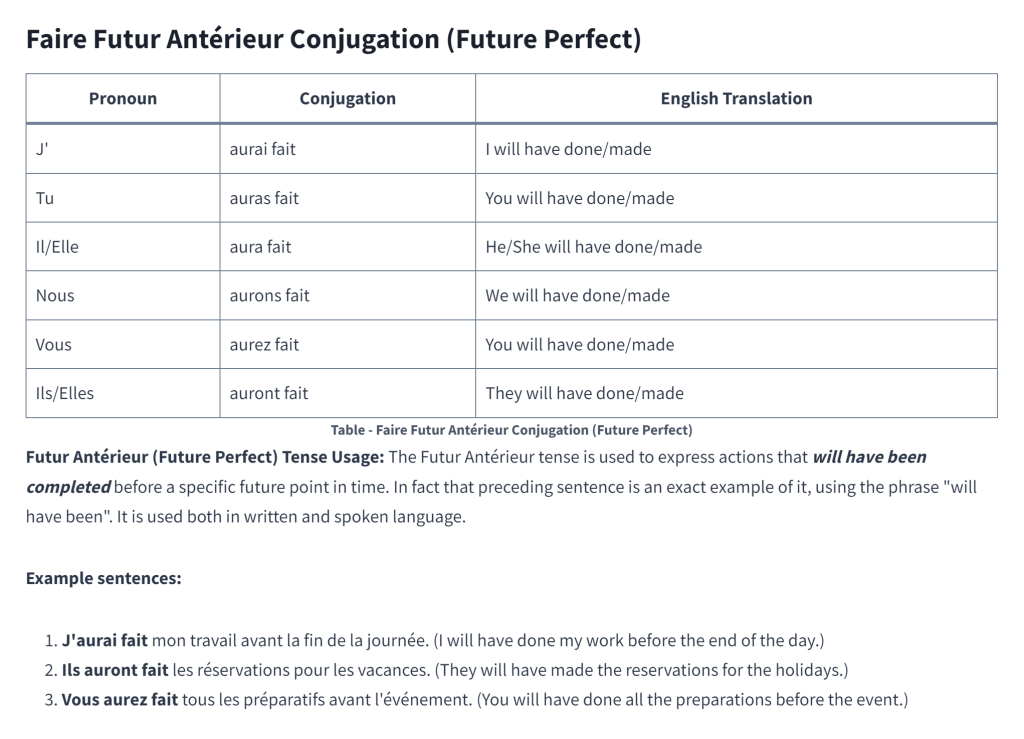
Other French Verb Conjugations You May be Interested In
We don’t only have manger conjugations! Here are some others you may want to check out! Also, check out this link which tells you the history of the word.
